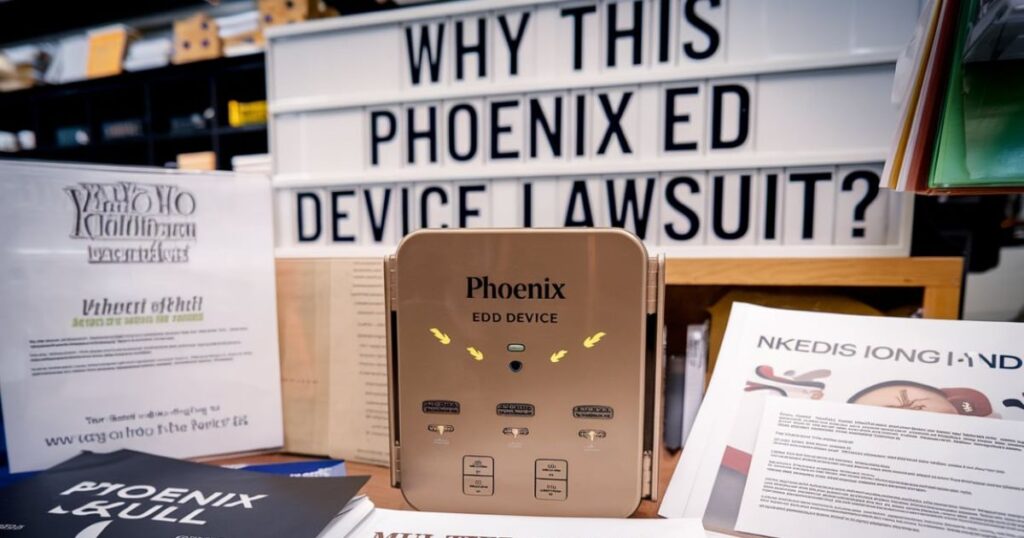In the world of men’s health, few topics are as sensitive and impactful as erectile dysfunction (ED). For millions of American men, ED isn’t just a medical condition; it’s a deeply personal issue that can affect relationships, self-esteem, and overall quality of life.
Enter the Phoenix ED Device, a product that promised hope to many struggling with this condition. However, what seemed like a beacon of light for ED sufferers has now become embroiled in a legal storm that’s shaking the foundations of the at-home medical device industry.
Background on The Phoenix ED Device
The Phoenix ED Device burst onto the scene as a revolutionary solution for men battling erectile dysfunction. Developed by Nutraceutical and Launch Medical, this at-home treatment device utilizes acoustic wave therapy, a technology that’s been gaining traction in medical circles for its potential to improve blood flow and tissue regeneration.
How does acoustic wave therapy work? The principle is straightforward:
- Low-intensity shock waves are directed at specific areas of the body
- These waves stimulate the growth of new blood vessels
- Improved blood flow can lead to better erectile function
The Phoenix ED Device promised to bring this technology into the comfort and privacy of one’s home. Marketed as a non-invasive, drug-free alternative to traditional ED treatments, it seemed to offer a perfect solution for men hesitant about medications or more invasive procedures.
Nutraceutical Corporation, under the leadership of CEO Dwayne Gutierrez, positioned the Phoenix ED Device as a game-changer in the ED treatment market. Their marketing materials boasted impressive claims:
- Significant improvement in erectile function
- Increased sexual performance and stamina
- A safe, FDA-approved alternative to pills and injections
- Easy-to-use at-home treatment
These promises, combined with a 60-day “risk-free guarantee,” made the Phoenix ED Device an attractive option for many men desperate for a solution to their ED woes.
The Science Behind Acoustic Wave Therapy
To understand the appeal of the Phoenix ED Device, it’s crucial to delve into the science behind acoustic wave therapy. This treatment method, also known as low-intensity extracorporeal shockwave therapy (Li-ESWT), has been studied in various medical fields, including urology.
The theory is that these shock waves can:
Stimulate the release of growth factors in penile tissue
Promote angiogenesis (formation of new blood vessels)
Break up micro-plaque in existing blood vessels
Some studies have shown promising results, with improvements in erectile function reported by participants. However, it’s important to note that much of this research is still in its early stages, and the long-term efficacy of acoustic wave therapy for ED is not yet fully established.
Read Also: Immediate X5 Intal: Revolutionizing Crypto Trading in the USA
Why This Phoenix ED Device Lawsuit?

The bubble of hope surrounding the Phoenix ED Device burst in August 2022 when a class-action lawsuit was filed in a California state court.
The lawsuit, spearheaded by the law firm Peiffer Wolf Carr Kane & Conway, represents a group of disgruntled purchasers who claim they were misled by the device’s marketing and left disappointed by its performance.
At its core, the lawsuit alleges that Nutraceutical Corporation and CEO Dwayne Gutierrez engaged in deceptive marketing practices, making grand promises about the device’s efficacy without substantial scientific evidence to back up these claims.
The plaintiffs argue that they were sold a dream of renewed sexual vigor, only to be left with an expensive piece of equipment that failed to deliver on its promises.
The Impact on Consumers
The lawsuit highlights the vulnerability of consumers seeking solutions for sensitive health issues. ED can have a profound impact on a man’s life, affecting not only his physical health but also his mental well-being and relationships. The promise of an easy, at-home solution can be incredibly appealing, especially for those who may feel embarrassed about seeking traditional medical help.
“When you’re dealing with something as personal as ED, you want to believe there’s a simple solution,” says Dr. John Smith, a urologist not involved in the lawsuit. “Unfortunately, this often makes people more susceptible to marketing claims that may not be fully substantiated.”
What Are The Allegations and Key Issues?

The lawsuit against the Phoenix ED Device isn’t just about a product failing to meet expectations. It delves into serious allegations of misconduct and deception. Let’s break down the key issues:
Exaggerated Efficacy Claims
- The lawsuit alleges that Nutraceutical made bold statements about the device’s ability to improve sexual performance without sufficient scientific backing.
- Plaintiffs claim they were led to believe they would experience dramatic improvements, which did not materialize.
False FDA Approval Claims
- One of the most serious allegations is that the company falsely claimed FDA approval for the device.
- FDA approval is a critical factor for many consumers when choosing medical devices, as it implies a certain level of safety and efficacy.
Inadequate Disclosure of Risks
- Users reported experiencing side effects such as itching, blisters, and discomfort.
- The lawsuit claims these potential risks were not adequately disclosed to consumers.
Deceptive Refund Practices
- Despite advertising a 60-day “risk-free guarantee,” many customers claim their refund requests were denied or ignored.
- This alleged practice left dissatisfied customers out of pocket for a device they felt didn’t work as promised.
These allegations paint a picture of a company prioritizing profit over consumer safety and satisfaction. If proven true, they could have far-reaching implications not just for Nutraceutical, but for the entire at-home medical device industry.
Case Study: The Importance of FDA Approval
To understand the gravity of the false FDA approval claim, let’s consider a hypothetical case:
John Doe, a 55-year-old man struggling with ED, came across the Phoenix ED Device online. The product’s claim of FDA approval was a key factor in his decision to purchase, as he believed this meant the device had been thoroughly tested and deemed safe by a reputable government agency.
After using the device for several weeks without improvement and experiencing some discomfort, John discovered the FDA approval claim was false. He not only felt deceived but also worried about potential long-term health effects from using an unapproved device.
This case illustrates how false claims of FDA approval can lead consumers to make decisions they might otherwise avoid, potentially putting their health at risk.
Legal Proceedings and Timeline
The legal journey of the Phoenix ED Device lawsuit has been ongoing since its inception in August 2022. Here’s a breakdown of the key events and what’s on the horizon:
| Date | Event |
| August 2022 | Class-action lawsuit filed in California state court |
| November 2022 | Court denies Nutraceutical’s request to move the case to arbitration |
| Current | Case remains in state court, proceeding towards further litigation |
| Future | Plaintiffs seek $5 million in damages and class certification |
The denial of arbitration was a significant early victory for the plaintiffs, as it keeps the case in the public eye and potentially allows for a broader range of legal strategies.
As the case progresses, several key steps are anticipated:
Class Certification: The plaintiffs will seek to have the lawsuit certified as a class action, potentially allowing more Phoenix ED Device purchasers to join the suit.
Discovery Phase: Both sides will gather and exchange information, which could reveal more details about the device’s development, marketing, and customer complaints.
Potential Settlement Talks: It’s not uncommon for cases like this to enter settlement negotiations before reaching trial.
Trial: If a settlement isn’t reached, the case could proceed to trial, where a jury would decide on the merits of the allegations.
The outcome of this lawsuit could have significant implications not just for Nutraceutical and the Phoenix ED Device, but for the broader market of at-home medical devices and ED treatments.
The Role of Expert Testimony
As the case moves forward, expert testimony will likely play a crucial role. Medical experts may be called upon to:
- Evaluate the scientific basis for the device’s claimed effectiveness
- Assess the potential risks and side effects of acoustic wave therapy
- Compare the Phoenix ED Device to other established ED treatments
Legal experts specializing in FDA regulations and medical device marketing may also be brought in to weigh in on the validity of the company’s marketing claims and practices.
Broader Implications and Consumer Advice

The Phoenix ED Device lawsuit serves as a stark reminder of the importance of due diligence when considering any medical treatment, especially those used in intimate areas of health. For consumers, particularly those dealing with sensitive issues like ED, this case highlights several key takeaways:
Scrutinize Marketing Claims: Be wary of products that promise miraculous results, especially without solid scientific backing.
Verify FDA Approval: For medical devices, FDA approval is crucial. Always verify these claims independently.
Consult Healthcare Professionals: Before trying any new ED treatment, consult with a doctor who can provide personalized advice.
Understand Your Rights: Familiarize yourself with refund policies and consumer protection laws in your state.
For the broader medical device industry, this lawsuit may lead to increased scrutiny and potentially stricter regulations, especially for at-home treatments targeting sensitive health issues.
The Future of At-Home Medical Devices
The Phoenix ED Device case raises important questions about the future of at-home medical devices:
- How can regulatory bodies keep up with the rapid pace of medical device innovation?
- What role should direct-to-consumer marketing play in the medical device industry?
- How can companies balance the desire for accessible treatments with the need for proper medical oversight?
As technology continues to advance, these questions will become increasingly relevant, not just for ED treatments but for a wide range of medical conditions.
The Road Ahead
As the legal proceedings unfold, the future of the Phoenix ED Device and Nutraceutical Corporation hangs in the balance.
The company faces an uphill battle to rebuild consumer trust, regardless of the lawsuit’s outcome.
For men struggling with ED, this case underscores the complexity of finding effective treatments and the importance of approaching “miracle cures” with healthy skepticism.
Potential Outcomes and Industry Impact

The resolution of this lawsuit could have several potential outcomes:
Financial Penalties: If found liable, Nutraceutical could face significant financial penalties, potentially reaching the $5 million sought by plaintiffs.
Regulatory Changes: The case might prompt stricter FDA oversight of acoustic wave therapy devices and similar at-home treatments.
Industry Ripple Effects: Other companies in the ED treatment market may reevaluate their marketing strategies and product claims.
Consumer Awareness: The publicity surrounding the case could lead to increased consumer skepticism towards unproven medical treatments.
Ultimately, the Phoenix ED Device lawsuit serves as a cautionary tale in the intersection of medical innovation, marketing, and consumer protection.
As we await further developments, it’s clear that this case will have lasting implications for how medical devices, particularly those targeting sensitive health issues, are marketed and sold to consumers.
Conclusion
Whether you’re considering the Phoenix ED Device or any other medical treatment, remember: your health is paramount. Always seek professional medical advice, do your research, and approach bold claims with a critical eye.
The path to treating ED may have its challenges, but with proper guidance and informed decision-making, effective solutions are within reach. As this legal battle continues to unfold, it serves as a powerful reminder of the need for transparency, scientific rigor, and ethical practices in the medical device industry.

